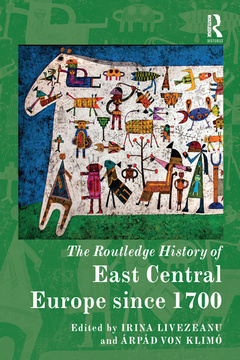The Routledge History of East Central Europe since 1700 Routledge Histories Series
Coordonnateurs : Livezeanu Irina, von Klimo Arpad

Covering territory from Russia in the east to Germany and Austria in the west, The Routledge History of East Central Europe since 1700 explores the origins and evolution of modernity in this turbulent region. This book applies fresh critical approaches to major historical controversies and debates, expanding the study of a region that has experienced persistent and profound change and yet has long been dominated by narrowly nationalist interpretations.
Written by an international team of contributors that reflects the increasing globalization and pluralism of East Central European studies, chapters discuss key themes such as economic development, the relationship between religion and ethnicity, the intersection between culture and imperial, national, wartime, and revolutionary political agendas, migration, women?s and gender history, ideologies and political movements, the legacy of communism, and the ways in which various states in East Central Europe deployed and were formed by the politics of memory and commemoration. This book uses new methodologies in order to fundamentally reshape perspectives on the development of East Central Europe over the past three centuries.
Transnational and comparative in approach, this volume presents the latest research on the social, cultural, political and economic history of modern East Central Europe, providing an analytical and comprehensive overview for all students of this region.
List of maps
List of figures
List of tables
Acknowledgements
List of contributors
Introduction
Irina Livezeanu and Arpad von Klimo
1 – Space: Empires, Nations, Borders
Bernhard Struck and James Koranyi
2 – Rural and Urban Worlds: Between Economic Modernization and Persistent Backwardness
Jacek Kochanowicz and Bogdan Murgescu
3 – Demography and Population Movements
Theodora Dragostinova and David Gerlach
4 – Religion and Ethnicity: Conflicting and Converging Identifications
Joel Brady and Edin Hajdarpasic
5 – The Cultures of East Central Europe: Imperial, National, Revolutionary
Irina Livezeanu, Thomas Ort and Alex Drace-Francis
6 – Women’s and Gender History
Krassimira Daskalova and Susan Zimmerman
7 – Political Ideologies and Political Movements
Ulf Brunnbauer and Paul Hanebrink
8 – Communism and Its Legacy
Malgorzata Fidelis and Irina Gigova
9 – Returning to ‘Europe’ and the Rise of Europragmatism: Party Politics and the European Union since 1989
Reinhard Heinisch
10 – Uses and Abuses of the Past
Patrice Dabrowski and Stefan Troebst
Index
Irina Livezeanu is Associate Professor of modern European history at the University of Pittsburgh, USA. Her research has focused on culture and politics in twentieth-century Romania and Moldova. She is the author of Cultural Politics in Greater Romania: Regionalism, Nation Building, and Ethnic Struggle, 1918-1930 (1995). Her articles have appeared in Soviet Studies, Südosteuropa-Jahrbuch, Austrian History Yearbook, East European Politics & Societies, and La Nouvelle Alternative, among others. Her essays have been published in collective volumes in France, Romania, Britain, and the USA. She is past president of the Society for Romanian Studies, and co-editor of the Studii Româneşti/Romanian Studies/Études Roumaines/Rumänische Studien book series at Polirom in Iaşi, Romania.
Árpád von Klimó is Associate Professor of History at The Catholic University of America in Washington, DC, USA. His courses cover Modern Europe since 1789 and the History of Catholicism in the Global Age. He has published and conducted extensive research on nineteenth- and twentieth-century Hungarian, Italian and German social history. Recently, he also completed a monograph on the memory of World War II and the Holocaust in Hungary, focusing on the Novi Sad massacre of 1942 (Remembering Cold Days, 2017). His current project is on world-wide Catholicism and Anti-Communism during the second half of the 1970s, focusing on the figure of Cardinal József Mindszenty.
Date de parution : 06-2020
17.4x24.6 cm
Date de parution : 03-2017
17.4x24.6 cm
Thème de The Routledge History of East Central Europe since 1700 :
Mots-clés :
East Central Europe; Frederick III; east-central; Young Man; polishlithuanian; Augustus III; commonwealth; Dead Men; european; West Germany; countries; Vasil Levski; ottoman; Subcarpathian Rus; empire; East Central European Countries; habsburg; East Central European History; monarchy; East Central European Women; societies; East Central European Societies; East Central European states; East Central European Member States; revolutionary political agendas; Euroskeptical Parties; political movements; Ethnic Unmixing; Ethnographic Frontiers; Social Mission Society; EU Member State; Vardar Macedonia; Calling East Central Europe; Greek Catholic; Late Socialist Era; Married Women; Balkan States; EU Membership



